Japan's scientific and technological capabilities have long been considered a cause for concern. Typically discussed in connection with this issue is the decline in the standing of academic papers published in Japan. Academic papers are fundamentally important because they organize new research findings and undergo objective evaluation before being incorporated into the academic system. Such papers lay a foundation for people to lead intellectually rich lives through scientific and technological advancements. What has led to the decline, and what can be done about it? Top-level researchers in various fields from Japan and abroad gathered at a symposium held by the Japan Science and Technology Agency (JST) to engage in heated discussions. A number of basic issues were revealed, including research freedom, internationalization and the development of young researchers.
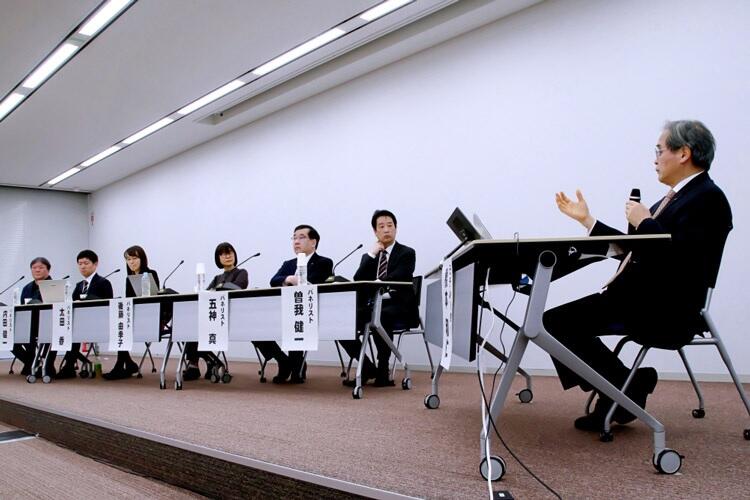
Heated discussions at the symposium in Tokyo's Chiyoda City.
Shock as Japan is 13th, its lowest ever placing in highly cited scientific papers
JST held an emergency symposium, "Urgent Debate: Why Is the Level of Attention Given to Japanese Papers Declining and What Should Be Done?" The event was held on March 11 at the JST Tokyo Headquarters Annex, in Chiyoda City. This symposium was sponsored by JST and supported by the Cabinet Office and the Ministry of Education, Culture, Sports, Science and Technology (MEXT). More than 1,000 people attended the event, both in person and online, and more than 50 members of the press registered to cover the event, indicating a high level of interest. The titles and other data given below are as of March 11.
First, Dr. Kazuhito Hashimoto, President of JST, analyzed the current situation and raised relevant concerns. Hashimoto is a leading expert in photocatalyst and light energy research and has long been involved in science and technology policy. He has served as a member of the government's Council for Science, Technology and Innovation (CSTI) and as an advisor on science and technology to the Cabinet Secretariat.
In a 2009 survey, Japan ranked 5th based on the top 10% of the most-cited scientific papers with high academic value. Last year, however, Japan was overtaken by Iran and dropped to 13th place, a record low. Trends in domestic and international science and technology activities are analyzed in detail in the "Science and Technology Indicators" of the National Institute of Science and Technology Policy (NISTEP), MEXT.
Hashimoto explained that the total number of papers from Japan is increasing; however, the number of cited scientific papers in the top 10% is decreasing. He remarked that the situation is similar to Japan's gross domestic product (GDP). Although Japan's GDP is among the world's highest, its per capita GDP has declined significantly. Total government spending on science and technology research is also high; Japan ranks third in this regard after China and the United States. He noted, "Japan's overall position should still be strong, but in terms of efficiency, publications per capita, and level of attention, its international standing is declining."
He added, "Through today's discussion, I would like to propose a prescription for reviving Japan's research capabilities. What should be done by the state? What should be done by the universities, the National Research and Development Agency and funding agencies such as JST? And what should be done by researchers and communities? Talk is cheap, let's all do what we can immediately," Hashimoto urged.
Following Hashimoto, six researchers shared their perceptions and real-life experiences, leading to a two-hour panel discussion.
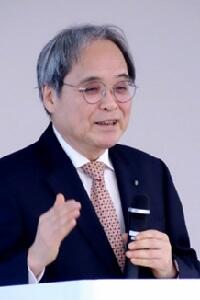
How to secure "free-thinking, bottom-up" research funding
As one might expect, more time was devoted to the issue of research funding than any other topic. The key point was perhaps made by Professor Yukiko Gotoh, who studies molecular biology and neuroscience at the University of Tokyo's Graduate School of Pharmaceutical Sciences. "The seeds of innovation are drying up in Japan," Gotoh stated.
Public competitive funding for research activities is, due to its nature, classified into two broad categories. One is top−down funding, in which strategic goals are set based on the policy and support is provided in line with it. The other is bottom−up funding, which is exemplified by Grants-in-Aid for Scientific Research (KAKENHI) and is intended to support research based on the free ideas of researchers. Both categories are important, like the two sets of wheels of a car, but Dr. Gotoh sees the relative thinning out of the latter as problematic.
"The total amount of funding for KAKENHI has increased slightly, but researchers have experienced a substantial decrease in real terms due to the increased number of applications. In addition to high prices and the weak yen, there is a steep rise in article publication and subscription fees. While top-down initiatives are important, the KAKENHI program is crucial because it creates new seeds in fields that are yet to receive attention. Obtaining a wide range of support is essential because it is difficult to predict outcomes. The government needs to increase subsidies for operating expenses and other basic expenses and double the amount of funding for KAKENHI." Gotoh's point aligns with the often-repeated argument about the importance of basic science.
In response to this, Dr. Makoto Gonokami, President of RIKEN, shared his views. Specializing in optical physics and quantum electronics, he served as President of the University of Tokyo from 2015 to 2021, where his management skills were noted; the first university bond was issued during his tenure. Gonokami stated, "What Dr. Gotoh says is obviously true. However, the funding for KAKENHI cannot be probably doubled under the current budget system considering that the decision-making structure involves various ministries and agencies. Nevertheless, (it might be possible) if a national strategy is properly implemented. If we can generate momentum through a bold change in thinking, like making an extraordinary investment in semiconductors, we might be able to take action."
Following Gonokami, Hashimoto stressed the point of funding, commenting, "Just saying, 'There is not enough money, so give us more' will do nothing to increase funding. I, too, strongly believe that there should be more funding for free-thinking research. However, if you increase research funding (from public funds), someone else will lose out, and people who lose out will oppose the move. For example, it is clearly improper to decrease social security spending. We have to get people on board. In the case of semiconductors, policymakers and people in other fields were on board with the idea that "focusing on semiconductors was essential for the country's future." So, a huge investment (of public funds) could be made. However, there is no shared recognition of the need to increase the amount of funding for KAKENHI and related operating expenses. There is still more that we can do, and only when we reach consensus on certain arguments will people outside the research community understand our position."
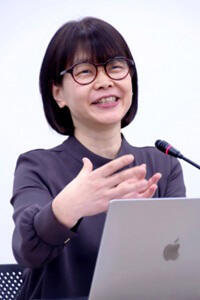
Research support programs "no longer flexible"
There are various research support programs in Japan, including those operated by JST. Various comments were made on their user-friendliness. Dr. Takuzo Aida is a supramolecular chemistry specialist and Deputy Center Director of the RIKEN Center for Emergent Matter Science. Aida said, "When the ERATO and CREST (support programs) started, they were flexible, but then they became stricter, demanding that researchers stick to the original research plan. The PRESTO (support program) originally maintained that only one person out of 30−40 needed to succeed. There was a time when you could do whatever you wanted to, but that has changed to 'Do what you have to do to meet the set goals.'"
Gonokami also recalled, "When I started ERATO in 1997, I was told, 'A good judge of horses should let the Pegasus run free'. Among the Pegasi, there was Dr. (Hidetoshi) Katori (who later demonstrated an ultra-high precision optical lattice atomic clock). So, we switched our focus to clock making which had not been our initial research purpose. I told the Ministry of Finance, 'That's what research is about,' but from the Ministry's point of view, that's the most troubling thing to hear, because public money has to be properly accounted for. For them, if they want to build a bridge properly, it's best to know the exact number of bricks needed. Managing the process as creatively as possible is the key for Japan to win." Hashimoto replied, "Administrative officials are serious people, so they will understand if you explain things properly in a reasoned manner."
ERATO, CREST, PRESTO, etc. are JST's Strategic Basic Research Programs. Hashimoto also spoke about these issues, saying, "I am also aware that these programs are being narrowed down, and since my appointment (as JST President), I have been working hard to broaden their scope."
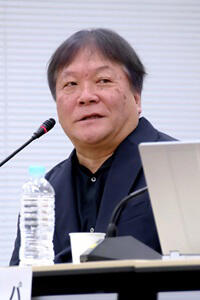
Participants at the symposium were invited to ask questions, of which several were discussed by the panel. One question led to a conversation about researchers' salaries. The panelists commented, "We need to create a system where salaries are paid in a way that allows researchers to understand how they are being evaluated, and the system needs to be more flexible" and "Many people give up on being researchers due to financial reasons or concerns about their future." Another commented, "We need to create an environment in which people are not forced to give up like that."
Hashimoto said, "There should be differences in salary between researchers who succeed and those who do not. However, with a few exceptions, there are almost no differentials at Japanese universities or National Research and Development Agencies." He vividly described his experience: "I tried to put differentials in place at the National Institute for Materials Science (NIMS) when I was President, but I couldn't do it because my hands were tied. Also, it is important to provide avenues for people of ability to work outside of academia, even if they do not succeed as researchers. The government is trying to do that," Hashimoto added, "but there are people who are against this move in university circles," he said, calling the situation problematic.
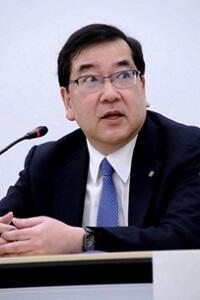
Don't get trapped in Japan, and take advantage of the trend toward diversity
Along with funding, another topic that was discussed in depth was internationalization. Japanese researchers, like Japanese people in general, face language barriers.
"Japanese researchers are not good at making friends," said Dr. Kaoru Ota, a professor at Muroran Institute of Technology's Center for Computer Science, who specializes in information communication and information networks. "Japanese people diligently attend international conferences, but during coffee breaks, they tend to stick together and do not make friends. They don't break into the international community, and instead of serving on committees at international conferences themselves, they normally ask people they know to do it. (Japanese people are unlikely to be chosen.) It's important to expand our networks." Gotoh interjected, "I agree. Japanese people stick together at overseas conferences. And these days, I'm the only Japanese researcher there."
Gonokami lamented the seriousness of the current situation: "Science has no borders, so networks are essential. It is important to keep writing papers to stay in the network and ensure the inflow of cutting-edge information so that we can maintain our research capabilities. If we don't take action, Japan will become invisible to the world in 10 years. In universities, as elsewhere, talented people will gather in places where they can have deep, sustained discussions. Our situation, in which there is almost no discussion among professors, is extremely worrying."
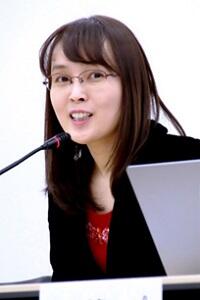
Aida emphasized the effectiveness of young people studying abroad. "When we send doctoral students abroad for a year or so, they change considerably. When your personality has been built up over several years of living in Japan, it is impossible to change it by yourself. Studying abroad gives you a chance to reshape it." The presence of foreigners in Japan is also important. "To change individuals' mindset, I think it would make a difference if about 30% of the people participating in the discussion were non-Japanese instead of only Japanese. It is very worrying that only Japanese people apply for almost all internationally open positions," Aida noted.
Dr. Kenichi Soga is a professor at the University of California, Berkeley, and is known as a pioneer in the field of smart infrastructure development using information and communications technology. He remarked, "When you go abroad, you become aware that you are a minority." In response, Ota commented, "Diversity (in race, gender, and other attributes) is something the research community abroad pays attention to, and once Japanese people become part of that community, they are highly valued and can play an active role. If it is difficult to suddenly go abroad, students can participate in international conferences in Japan to educate themselves, which may help change their mindsets."
Dr. Soga also commented, "Diversity is becoming a paradigm in the U.S., and it is becoming easier for Japanese people to be accepted. We should use this opportunity to create international networks." This comment seemed like timely advice for Japanese people in all fields, not only academia.
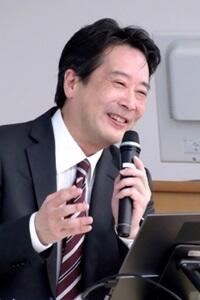
Bringing the excitement of research to students
Naturally, to enhance Japan's research capabilities in the future, the next generation must be attracted to research and choose it as a career. A striking point in this discussion was Aida's recollection: "I became a researcher because I discovered something unexpected in a single experiment. It moved me so much that I found myself trembling all over for the first time in my life. I realized that day that I had to become a researcher."
Aida continues to communicate this sense of inspiration to the next generation: "I have discussed this at length with people who want to talk about it. In several cases, I have seen students discover the motivation to become a researcher." However, he added, "Students have many other temptations in life, and very often they quit doing research before they experience its excitement. To prevent this, we need to make the profession of a researcher more attractive."
Kenichi Uchida is a Distinguished Group Leader at the NIMS Research Center for Magnetic and Spintronic Materials. He commented, "I decided to join the doctoral program because I realized 'how enjoyable it is.'" He stressed that "Conveying the appeal of research to students is an important mission for us." Gonokami added, "We can't afford to lose people who have a sense of curiosity." He expressed strong concern, saying, "As cyberspace becomes more sophisticated and the boundary between the real and virtual blurs, we need to be very deliberate in communicating the joy of real discovery to young people."
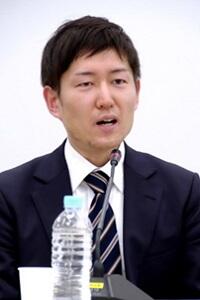
Admin overload: Researchers with no time for research
Improving the balance between research on the one hand and teaching and admin work on the other is a big issue, especially among university researchers. The panel discussed the need to reduce the burden on researchers in Japan. Attention was drawn to a video made by a former student of Aida's speaking about how things operate at a university in Singapore. That student said, "In Singapore, faculty members are never involved in entrance exam work."
Hashimoto said, "When I was at CSTI, I tried to propose a system where faculty members did not have to undertake entrance exam work. But there was opposition from some people at the university, and the whole idea was shut down." He discussed the difficulty of the situation, saying, "The government believes that lecturers should be doing less administrative work, but the problem is deep-rooted."
During interviews, university researchers often complained to the author about how overloaded they were with administration and school events. The declining birthrate seems to be driving universities to focus on enhancing students' educational experience. A professor in charge of preparing and leading the undergraduate students' overseas exchange program said, "I really understand the importance of these types of events for the students. However, they just keep piling up. I don't get the chance to sit down and do my research." It seems that the manpower status has not kept pace with the changing situation.
"The world needs Japan's scientific capabilities, and they must never be compromised."
Gonokami's powerful speech at the end of the symposium left a lasting impression. "The world needs Japan's scientific capabilities. Why? Because the world is in trouble. The number of opportunities is enormous. Japan's scientific capabilities must never be compromised. There is most definitely an exciting world of research, and we need to draw people into it and encourage them. It is not too late."
The day's discussions were so far-reaching that this article cannot cover them in any greater detail. Career paths for young researchers and other relevant issues are, of course, important concerns as well. Moreover, although it was not a topic of much discussion on this occasion, the word "excitement" was mentioned several times by the speakers. If we want to live intellectually rich lives, we need to experience a sense of excitement. This is true not only for researchers but also for individuals in general. Let researchers play a leading role in this task. The task requires steady efforts and cannot be tracked using indicators. Still, let us hope that Japanese researchers will continue to convey the fascination of solving the mysteries of the natural world and of pioneering new technology through various means. This kind of task will only add to the many burdens placed on researchers' time. However, the result will be a better public understanding of researchers' work, including "free-thinking, bottom-up" research. The role of the media is also important.
Kuraray, a major chemical manufacturer, conducted a "dream job" survey of children who graduated from elementary school last spring. "Researcher" came in fifth place. It is a popular choice for boys in particular, usually ranking in second place after "athlete." Despite such findings, enrollment in Japanese graduate doctoral programs has been on a long-term downward trend since peaking in 2003 (NISTEP "Science and Technology Indicators 2023"). Let us hope that young people will grow up with dreams of research, and by all means, let their aspirations blossom and become a source of future wisdom and virtue. We must be a society that can achieve this goal.
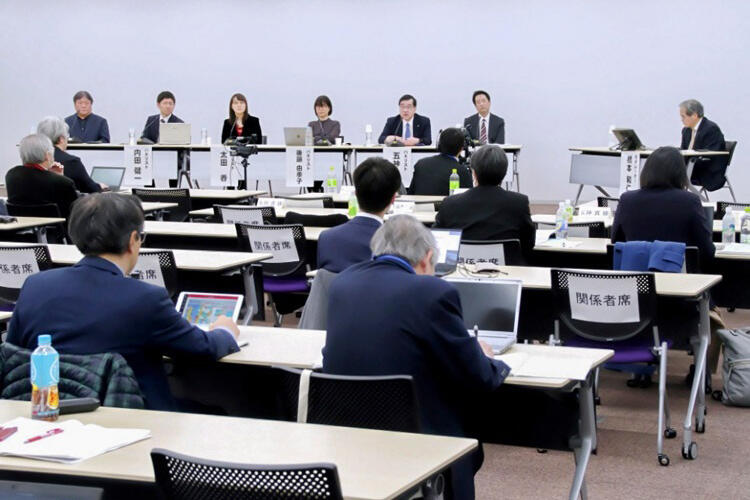
(Chiyoda City, Tokyo Prefecture)
(KUSAKA Takeo / Science Portal Editorial Office)
Original article was provided by the Science Portal and has been translated by Science Japan.




